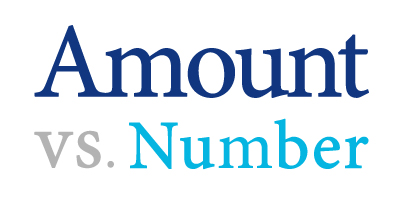Some nouns can be counted individually. A person could count the crayons in a box, the eggs in a carton, or the people on a train. These are called count nouns.
Other nouns can’t be counted individually. A person could not count air, dirt, or happiness. These are called mass nouns.
English has specific words to use in reference to the quantity of mass and count nouns. Amount and number are two such words. Continue reading to discover the difference between them, and to find out whether you should use number or amount.
What is the Difference Between Amount and Number?
In this article, I will compare amount vs. number and their uses. I will use each word in an example sentence to illustrate its proper meaning and context.
Then, I will explain a helpful trick to use when deciding whether to choose amount or number for your writing, depending on context.
When to Use Amount
 What does amount mean? Amount can be a noun or a verb.
What does amount mean? Amount can be a noun or a verb.
As a noun, it refers to the quantity of something. Amount is used with mass nouns. In other words, amount should be used with nouns that cannot be counted individually, also called non-count nouns. You cannot count the water in a glass, for instance, or the religious freedom in America.
Here are some examples,
- Mark asked Julia to read him the amount of olive oil called for in the recipe.
- 2016 has seen an increase in the amount of web traffic devoted to travel research.
- The WISE findings get astronomers within 0.1 parsec, revealing new insights into both the amount of energy that is released when a star is destroyed and the mechanics of black hole behavior as a whole. –TIME
When amount is used as a verb, it means to become or to equal. Here are two examples.
- He’s too lazy to amount to much.
- Our expenditures for the fiscal third quarter amount to $34,000.
When to Use Number
 What does number mean? Number is also a noun or a verb. Like amount, as a noun it refers to the quantity of something. Unlike amount, however, number is used with count nouns.
What does number mean? Number is also a noun or a verb. Like amount, as a noun it refers to the quantity of something. Unlike amount, however, number is used with count nouns.
Count nouns are nouns that could be counted individually. You could not count the sand on the seashore, for instance, but you could conceivably count how many grains of sand are in a small jar. Sand is a mass noun, and a grain is a count noun.
Here are some examples of number used as a noun.
- A number of small children were playing on the jungle gym.
- Julia asked Mark to read him the number of garlic cloves called for in the recipe.
- The government in recent months also has enforced curfews to reduce electricity use—a practice that has trimmed operating hours at malls and therefore cut back the number of screenings a cinema can squeeze in during a day. –The Wall Street Journal
Number can also be a verb, where it means to count or to add up to.
See the following sentences,
- To number the stars is not a trivial undertaking.
- The spectators at the football game numbered in the thousands.
Trick to Remember the Difference
 Now that we understand the differences, let’s look at a helpful trick to remember number vs. amount.
Now that we understand the differences, let’s look at a helpful trick to remember number vs. amount.
- Amount and number both refer to the quantity of something.
- Amount is used with mass nouns.
- Number is used with count nouns.
If you aren’t sure whether to use amount or number, remember that “a” “mount” is used with “a” “mass” noun. Amount and a mass noun both begin with the letters “am.” This should help you keep these words straight.
Summary
Is it amount or number? Amount and number both refer to quantity, but each word has its own specific use.
- Number is used with nouns that can be individually counted, like stars.
- Amount is used for nouns that cannot be individually counted, like starlight.
By remembering the M that is part of the words amount and mass, you can be sure to reserve amount for use with mass nouns.
If you still need help, you can reference this article in the future.
Contents
